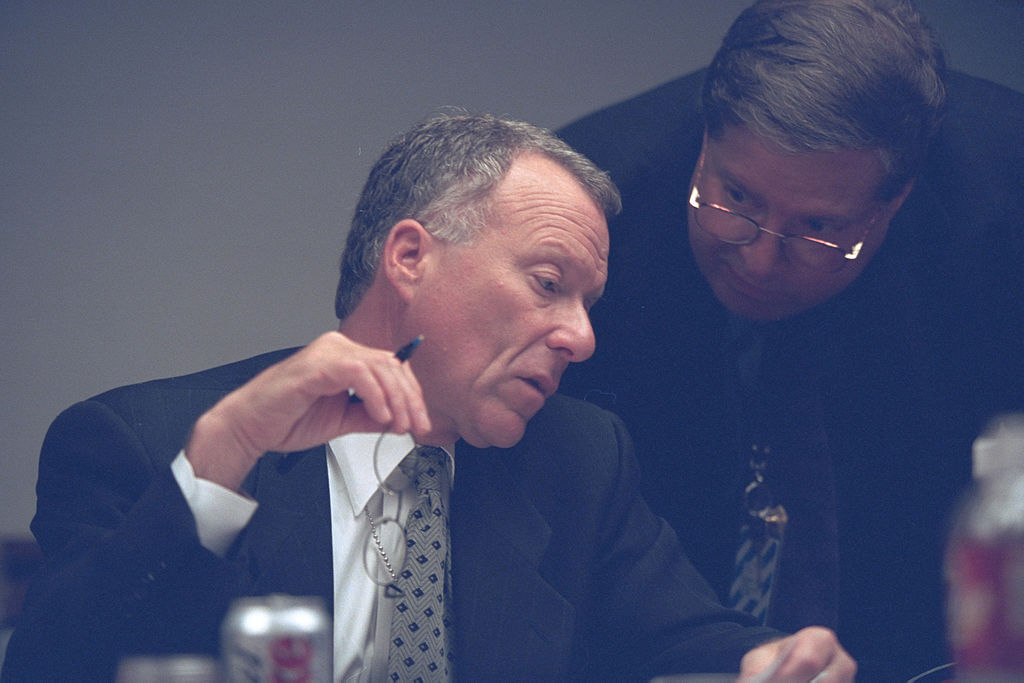What to Make of Trump’s Pardon of Scooter Libby?
Editor's note: This piece has been updated in light of events.
President Trump’s pardon of Scooter Libby, chief of Staff to former Vice President Dick Cheney, came unexpectedly, and prompts the question: Why this, and why now?

Published by The Lawfare Institute
in Cooperation With

Editor's note: This piece has been updated in light of events.
President Trump’s pardon of Scooter Libby, chief of Staff to former Vice President Dick Cheney, came unexpectedly, and prompts the question: Why this, and why now?
Early commentary has noted the obvious parallels: This was the pardoning of a former senior government official, charged by a special prosecutor with obstruction, perjury and making false statements. In the Libby case, the special prosecutor, Patrick Fitzgerald, did not bring charges on the central question in the investigation: the unauthorized release of classified information in the fabled “Valerie Plame” case. Convinced of “No COLLUSION!” and that the Mueller investigation is running amok, Trump may have wished to make a point with this pardon. And perhaps, too, he wanted to display how the pardon power can be used to reward the stalwart refusal of an underling to turn on the boss.
The move resonates in other ways with the situation now facing the president. His preoccupation at the moment seems to be Deputy Attorney General Rod Rosenstein. Following the raid on the offices of Trump’s personal lawyer Michael Cohen, the president’s objections to Rosenstein’s role have intensified. Apart from his natural anxiety about what befell his lawyer and what it means for him personally, Trump is intensely focused on what he perceives to be Rosenstein’s inadequate supervision of the special counsel. He has recently heard Alan Dershowitz’s judgment in public comments, and maybe in private conversations as well, that Rosenstein—presumably a witness in the obstruction investigation—should be subject to a recusal motion and removed from the supervision of the Russia matter.
Dershowitz expressed similar concerns about uncontrolled special prosecutors in the Libby case, joining other academics, including Vikram Amar and Robert Bork, in an amicus brief raising the question of whether the appointment of Fitzgerald violated the appointments clause of the Constitution. At this point in the narrative, James Comey makes an appearance as deputy attorney general. After Attorney General John Ashcroft recused himself from the matter, Comey appointed Fitzgerald, then the United States attorney for the northern district of Illinois—giving him “plenary” authority to investigate crimes committed in connect with the release of the classified information, “as well as federal crimes committed in the course of, and with intent to interfere with, your investigation.” Comey’s appointment explicitly relieved Fitzgerald of any limitations that would apply under the special counsel regulations. Fitzgerald was a special prosecutor who was not, in formal terms under the rules, a special counsel.
Dershowitz and his co-authors raised the constitutional question of whether Fitzgerald, functioning with so little supervision under this grant of “plenary authority” could qualify as a lawfully appointed “inferior officer.” Libby’s lawyers raised the same claim, moving to dismiss on these grounds. The United States argued in opposition that Fitzgerald remained limited in jurisdiction, bound by Justice Department policies in the same way as all departmental employees, and subject to removal by the deputy attorney general. The D.C. federal district court sided with the government.
This set of issues ties thematically back into the current attack on Rosenstein. Of course, Mueller received his appointment pursuant to the special counsel regulations: The appointment issues here are not formally the same as in the Fitzgerald case. But Trump’s lawyers may believe, or wish to argue, that the attack on Rosenstein implicates similar concerns: the deputy attorney general’s effectiveness in supervising an investigation in which he is also a witness.
It is not clear how Libby's pardon advances the president’s cause directly. But Trump has never showed much interest in Libby’s conviction—until now. Perhaps the subject arose during discussions about Rosenstein and Mueller. Trump may have been moved to act, as he often does, on impulse, experiencing newfound sympathy for Libby’s plight that he imagines to be so much like his own. He may be especially focused on the obstruction report that, according to news accounts, Mueller is preparing for Rosenstein, who then has a complex decision to make about his authority to provide that report to the Congress or the public.
Then again, this action could also reflect a strategic move in the president’s legal defense. Trump’s lawyers may have thought that the president could improve on his expressions of personal pique by building his constitutional case against Mueller by taking this action now in the Libby case—by demonstrating that Trump will do what it takes, including using pardons, to bring special or independent counsels (or special prosecutors) under control and to remedy what Trump believes to be their abuses.
So Libby’s pardon is not as much of an abrupt change of subject as it might appear. By this action in a totally unrelated matter, Trump may be looking to cloak in principle at some future time his exercise of the power of his office to protect himself.





